|
|
 |
 |
 |
 |
Summary Report
IISD Reporting Services (IISD RS) has produced a summary and analysis from this meeting. To download our report please click below in the HTML or PDF icons. |
|
 |
 |
 |
 |
|
 Ninth Rights and Resources Initiative (RRI) Dialogue on Forests, Governance and Climate Change Ninth Rights and Resources Initiative (RRI) Dialogue on Forests, Governance and Climate Change
8 February 2011 | London, England |
 |
 |
 |
 |
The ninth Rights and Resources Initiative (RRI) Dialogue on Forests, Governance and Climate Change took place in London, UK, on Tuesday, 8 February 2011. Co-organized with Forests Peoples Programme (FPP), Forest Trends and Tebtebba (Indigenous Peoples' International Centre for Policy Research and Education), the meeting was attended by approximately 140 participants and brought together international organizations, political representatives, civil servants and representatives from civil society organizations, academia and the private sector from around the world.
Participants convened in four panel sessions and discussions on: global implications of the Cancún Agreement on Long-term Cooperative Action (Cancún Agreement) for forests and people; national- and community-level implications of the Cancún Agreement; ensuring that REDD+ complements restoration, poverty alleviation and adaptation; and promoting and operationalizing safeguards and accountability. Panelists included representatives of international and non-governmental organizations, civil society organizations and the private sector. The Dialogue was also addressed by ministers from the UK Department of Energy and Climate Change, and the Department for International Development.
Download the IISD RS summary of the Dialogue in HTML or PDF format. |
|
 |
 |
 |
 |
|
 |
 |
 |
 |
| MORNING – OPENING SESSION |
|
 |
 |
 |
 |
 |
 |
 |
 |
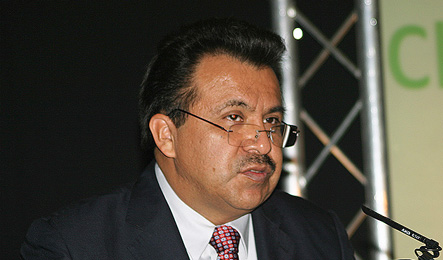 |
| Juan Manuel Torres Rojo, Director General, Mexico National Forestry Commission, highlighted key REDD+ elements of the Cancun Agreements. |
|
 |
 |
 |
 |
|
 |
 |
 |
 |
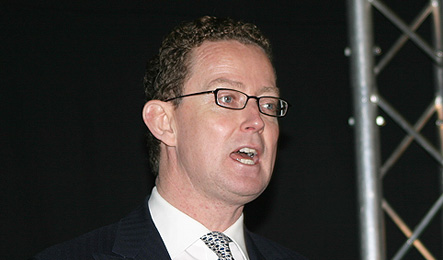 |
| Gregory Barker, MP, Minister of State, Department of Energy and Climate Change, UK, noted that the UK Government has committed £2.9 billion for climate finance, including a significant proportion for forests. |
|
 |
 |
 |
 |
|
 |
 |
 |
 |
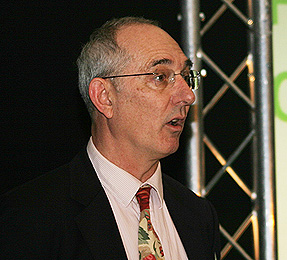 |
| Marcus Colchester, Director, FFP, invited participants to reflect on what had transpired in Cancún. |
|
 |
 |
 |
 |
|
 |
 |
 |
 |
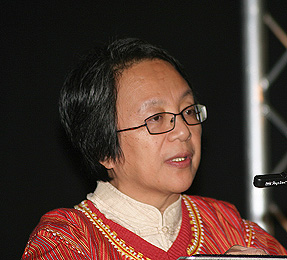 |
| Victoria Tauli Corpuz, Executive Director, Tebtebba, underlined the importance of indigenous peoples as agents of good governance if REDD+ is to succeed. |
|
 |
 |
 |
 |
|
 |
 |
 |
 |
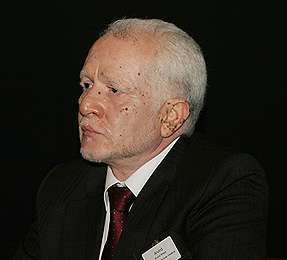 |
| Arvind Khare, Executive Director, RRG, highlighted that solutions must address multiple dimensions of the climate change crisis, stressing that any solution that only focuses on one dimension will not suffice. He said that the entrepreneurial potential of the 1 billion people in forest communities must be “unleashed.” |
|
 |
 |
 |
 |
|
 |
 |
 |
 |
| SESSION ONE - Global Implications of the Cancún Agreement on Long-term Cooperative Action |
|
 |
 |
 |
 |
 |
 |
 |
 |
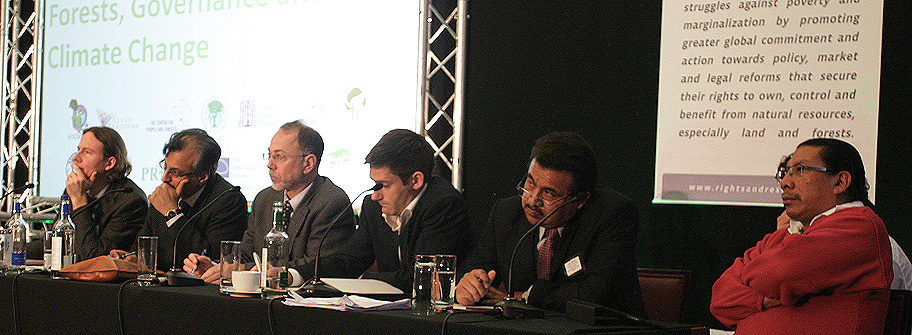 |
| Session One panel (L-R) David Capper, Head of Climate Finance, Institutions and Forests, Department of Energy and Climate Change, UK; Abyd Karmali, Managing Director and Global Head of Carbon Emissions, Bank of America Merrill Lynch; Andy White, Coordinator, RRI; Andreas Dahl-Jorgensen, Advisor, Government of Norway’s International Climate and Forest Initiative; Juan Manuel Torres Rojo, Director General, Mexico National Forestry Commission; Onel Masardule, Executive Director, Foundation for Promotion of Indigenous Knowledge, Kuna Peoples, Panama. |
|
 |
 |
 |
 |
 |
 |
 |
 |
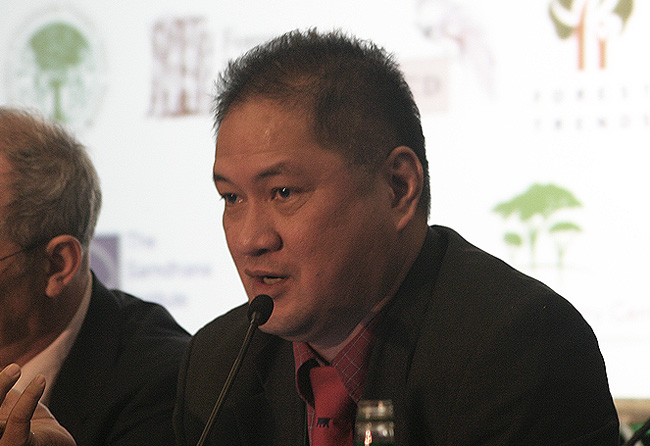 |
| Tony La Viña, Dean, Ateneo School of Government, Philippines, during the session on national- and country-level implications of the Cancun Agreement. |
|
 |
 |
 |
 |
 |
 |
 |
 |
| SESSION 3 - Ensuring that REDD+ Complements Restoration, Poverty Alleviation and Adaptation |
|
 |
 |
 |
 |
 |
 |
 |
 |
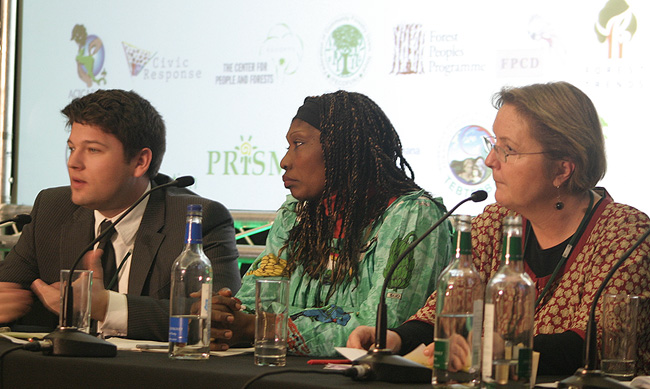 |
| (L-R) Jeffrey Hatcher, RRI; Cecile Njdébet, Director, Cameroon Ecology; and Susanne von Walter, Senior Programme Officer, SwedBio |
|
 |
 |
 |
 |
 |
 |
 |
 |
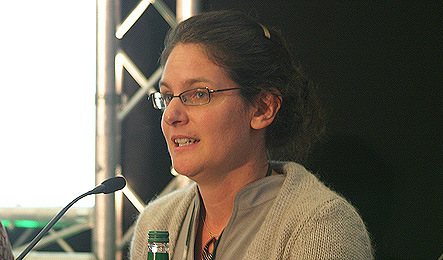 |
| Florence Daviet, Co-Manager, Governance of Forests Initiative, World Resources Institute described her organization's discussions on the linkages between REDD and adaptation. She noted that REDD can support many objectives where these have been clearly identified e.g. prevention of landslides through a moratorium on logging. Daviet added that advantages other than climate change mitigation were driving REDD. |
|
 |
 |
 |
 |
|
 |
 |
 |
 |
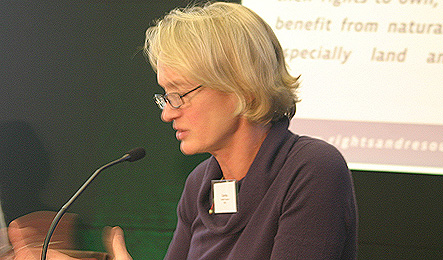 |
| Camilla Toulmin, Director, IIED, chaired the session on ensuring that REDD+ complements restoration, poverty alleviation and adaptation. |
|
 |
 |
 |
 |
|
 |
 |
 |
 |
| SESSION 4 - Promoting and Operationalizing Safeguards and Accountability. |
|
 |
 |
 |
 |
 |
 |
 |
 |
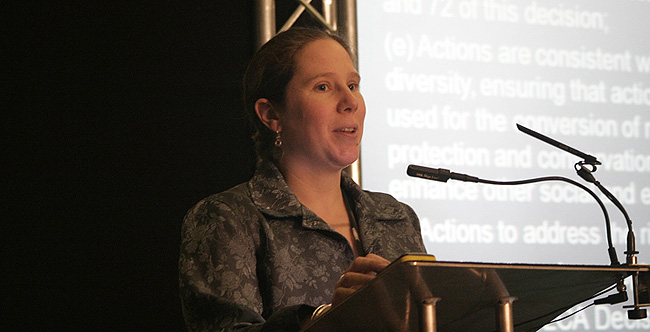 |
| Kristin Hite, Attorney, Climate Change Program, Center for International Environmental Law highlighted the importance of sequencing and the early consideration of safeguards in a wide-ranging presentation comparing and contrasting current approaches, including those at the UN and at the Bretton Woods institutions. |
|
 |
 |
 |
 |
 |
 |
 |
 |
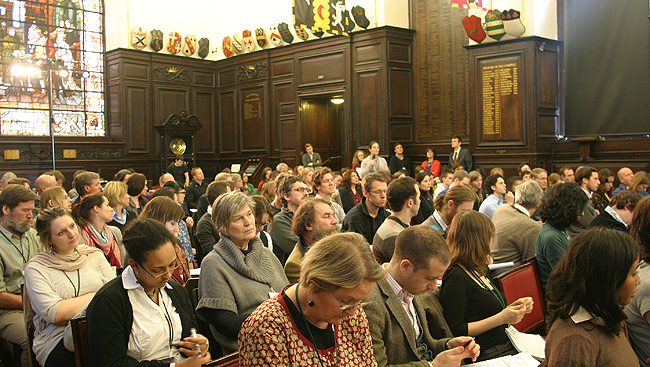 |
| Standing room only during the Ninth RRI Dialogue. |
|
 |
 |
 |
 |
 |
 |
 |
 |
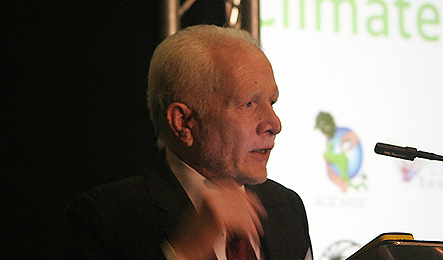 |
| In closing remarks, Arvind Khare, RRG, noted that the ideas behind REDD are already being redefined at national and local level, and in the territories of indigenous peoples, and that there seems to be a distinct realization that indigenous peoples and communities will continue to assert their tenure with their territorial and human rights, define implementation of REDD on their own terms, irrespective of the sources of funding, and ultimately define REDD+. |
|
 |
 |
 |
 |
|
 |
 |
 |
 |
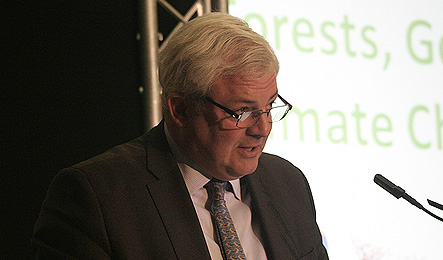 |
| Stephen O’Brien, Parliamentary Under Secretary of State for International Development, UK, highlighted the UK Government’s efforts to promote forest governance, effective forestry laws and trade considerations. |
|
 |
 |
 |
 |
|
 |
 |
 |
 |
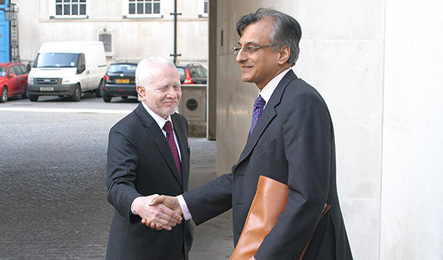 |
| Arvand Khare, RRG and Abyd Karmali, Bank of America Merrill Lynch. |
|
 |
 |
 |
 |
|
 |
 |
 |
 |
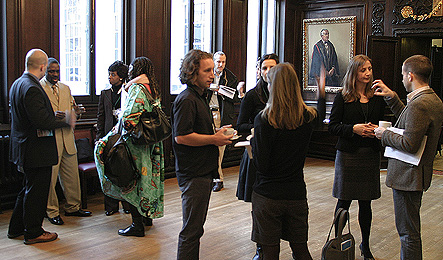 |
| Participants in the Stationer’s Hall during the Ninth RRI Dialogue. |
|
 |
 |
 |
 |
|
|
|